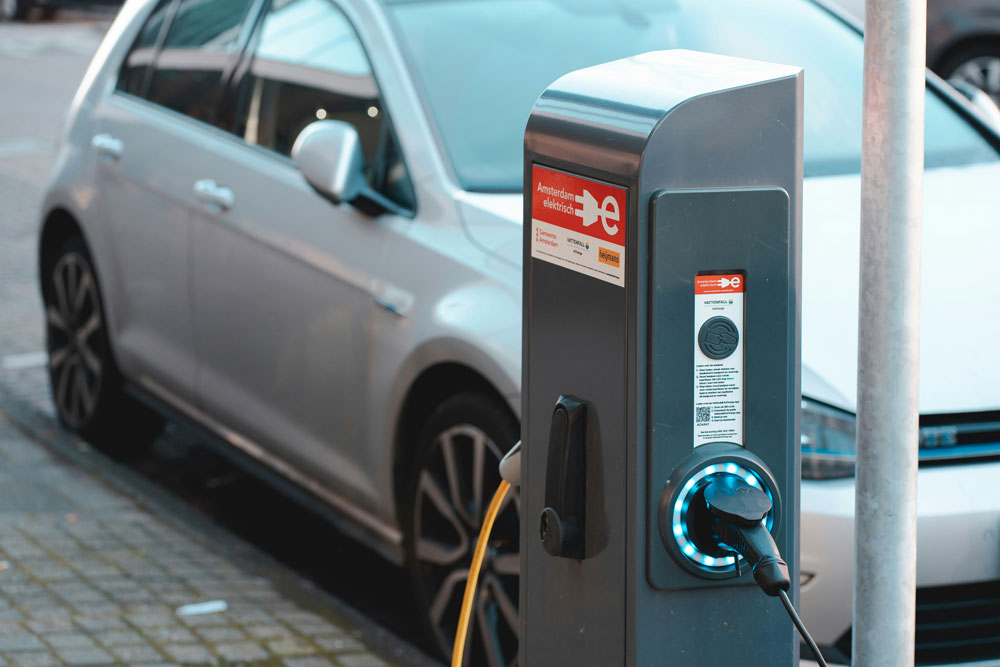Project #1: Charging Stations of the Future
April ’24 Update
Project leads: Hongjie Wang, Utah State University, & Scott Trimboli, University of Colorado-Colorado Springs

Key Accomplishments for this Quarter:
- Presented one paper at ISGT 2024, and two papers at APEC 2024.
- Papers accepted for publication at ECCE-Asia 2024, WPTCE 2024, and PSGM 2024.
- Submitted a digest to COMPEL 2024.
- Collected aging data for 3 SiC MOSFETs used in the MW wireless charger.
- Submitted a journal paper on optimizing unfolder-based EV charger design through zero voltage switching analysis.
- Working on a journal submission on the evaluation of impacts from large-scale charging loads on the distribution power grid.
- Finished the user survey development to understand the reliability status of existing charging infrastructure.
- The thermal model has progressed. We have been able to run simulations and are in the process of fine-tuning boundary conditions for the full model simulation.
- A component-based 2D numerical model for the Ferrite core is developed to capture highest temperature and temperature distribution within it.
- Numerical modeling of pool boiling for the immersion cooling concept has also been recently initiated. The initial work is focused on understanding the modeling parameters and model verification using published works in the literature.
- Two students passed PhD dissertation proposal defense.
- A manuscript titled “Analytical Modeling of PCM in the Melting Process and Numerical Modeling of Hybrid PCMs integrated with Heat Sink for Wireless Super-Fast Charging of EVs” is under review with International Communications in Heat & Mass Transfer.
- Public Education materials prepared for March 14’s K-5 STEM Night.
- Data collection is in progress for a case study application of the equity measurement (accessibility) tool.
- Preliminary calculations of accessibility to EV charging stations by US Census block group in El Paso.
- Presented a paper (“Electric vehicle charging infrastructure deployment: A discussion of equity and justice theories and accessibility measurement”) at the 103rd Annual Meeting of the Transportation Research Board, Washington, DC. Submitted same paper to Transportation Research Interdisciplinary Perspectives journal. Received a “revise” decision; revision in progress.
- Investigated and compared different EV charging station planning tools, considering private vs. public organizations, regional vs. national scale, various indicators and weights, capabilities, etc. Working on a paper about this.
- Working with USU Landscape Architecture and Environmental Planning students in design studios, to develop typologies of charging stations in various settings, specifically one at an urban park (Salt Lake City), and one at a rural/recreational/historic convenience store (Wilson, WY). Met with stakeholders.
- Recruited four students from diverse backgrounds and experiences as research assistants to work on this task. Notably, two of the research assistants identify as Hispanic, and one of them is female.
- Currently working with USU Landscape Architecture and Environmental Planning students in design studios, to envision how charging stations could fit in recreation and open space settings.
- Submitted a review paper to IET Communications on communication for charging infrastructure.
- Started to work on a collaborative proposal that will be submitted to NSF in Q3.
- Monthly analytics of connected vehicle data for Indiana (Jan-Jun 2022).
- Monthly analytics of charging station deployment in Indiana (Jan-Jun 2022).
- Scalable methodologies as well as reporting procedures developed for both of the aforementioned tasks.
Industry and Innovation Highlights:
- Produced refined toolbox methods for cell characterization and improved model accuracy.
- Looked at Bi-directional, Mega-watt, Multi-port, and Medium-voltage grid-tied extreme fast charging systems and made progress on the preliminary design of such a system.
- Developed SiC MOSFET aging data collection platform and collected accelerated aging data for SiC MOSFET used in the MW wireless charger.
- Monthly analytics of connected vehicle data and charging station deployment for Indiana (Jan-Mar 2022).
Advancements in Alleviating Barriers or Challenges to Widespread EV Adoption:
- Improved the understanding and modeling of EV batteries.
- Made progress in high-power, multi-port, mega-watt, medium-voltage grid-tied charging system design to advance charging technologies.
- Made progress towards increased reliability for charging systems.
Advancements of Interest to Marginalized or Underserved Communities:
- We have one task focused on charging location decisions based on economics, accessibility, equity, and communities, where we conducted a literature review of transportation equity and accessibility indicators in Q1, with a specific emphasis on methodologies for evaluating equity within the realm of electric vehicle (EV) charging infrastructure.
- We hosted outreach events for people from different communities and are continuing to recruit students from underserved communities.